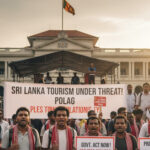The Inter-University Student Federation (IUSF) in Sri Lanka is campaigning for the government to increase education funding in its forthcoming 2026 budget. President Dissanayake, who also serves as the finance minister, is scheduled to present his Janatha Vimukthi Peramuna/National People’s Power (JVP/NPP) government’s national budget to parliament on November 7.
The IUSF leadership are members of the pseudo-left Frontline Socialist Party (FSP) and promote that party’s pro-capitalist political line among students at state universities and other higher education institutions. The federation was previously controlled by the JVP.
The federation’s current education budget campaign includes a series of seminars and press conferences. Addressing a seminar in Colombo on October 9 at the Lions Club auditorium, IUSF convenor Madhushan Chandrajith told his audience that the federation aimed to raise awareness of students’ problems.
For decades, the JVP, FSP, and IUSF have demanded that 6 percent of GDP be allocated annually to education. Sri Lanka’s education budget has only been around 1.2 to 1.5 percent of GDP—among the lowest in its income group internationally. Now, however, the IUSF has halved its previous demand and is campaigning for a 3 percent allocation.
On September 12, Chandrajith wrote to Dr. Harini Amarasuriya, the prime minister and education minister, stating: “Until an allocation of 6 percent of GDP for education is achieved, as an approach towards that goal, we propose a 3 percent allocation be made through the 2026 budget.”
During previous election campaigns—and when she was a leader of the Federation of University Teachers’ Associations—Amarasuriya herself called for 6 percent of GDP to be spent on education.
Mindful of the International Monetary Fund’s (IMF) austerity program and the ruling elite’s insistence on implementing it to the letter, the NPP’s election manifesto last year, A Thriving Nation! A Beautiful Country!, stated it would “gradually raise the allocation [for education] up to 6 percent of GDP.”
After coming to power, however, the JVP/NPP government changed its tune. In his first budget in February 2025, Dissanayake raised the education budget by a pitiful 29 billion rupees to 271 billion rupees ($US890 million) despite continuing high inflation.
Speaking to Sirasa TV on September 17, Amarasuriya said that although UNESCO recommends allocating 6 percent of GDP to education and 3 percent to health, this could not be done “abruptly.” Without “proper administrative changes,” she claimed, directing 6 percent of GDP to education “could lead to inefficiency.”
These claims are bogus. Amarasuriya’s rejection of any significant increase in education spending is because the government is completely committed to implementing the IMF’s austerity program, which demands the slashing of public expenditure.
At the Colombo seminar, Chandrajith said that the IUSF had repeatedly reminded the government, the education sector, and President Dissanayake about the crisis in education.
“It’s problematic why a government claiming to be a ‘government of the people’ does not hear these problems,” he said. He added that this government came to power with a “mandate from the people,” and must act accordingly.
Even while he criticised the government, Chandrajith declared: “We know that solutions for them cannot be provided like ‘instant noodles.’”
In other words, the IUSF leader was telling students: “Yes, we face unbearable problems, but we understand the government cannot solve them immediately. There’s an economic crisis in the country, so we must scale back our demands for education funding and wait patiently.”
The IUSF’s so-called education campaign is completely bogus. It aligns with the government’s demand that students, young people, workers, and the poor wait for the economic recovery that will follow the government’s full implementation of IMF measures. It is an “economic recovery” that will never come amid the worsening global economic crisis.
For Chandrajith to claim that the Dissanayake administration is a “people’s government” with a “popular mandate” is another lie. The JVP/NPP government is a pro-big-business regime totally committed to imposing the IMF’s dictates. Sri Lankans voted for the JVP/NPP not out of positive support but in protest against the traditional parties of the Sri Lankan capitalist elite.
The IUSF is promoting the illusion that the Dissanayake government can be pressured to address the social and economic issues facing students, workers, and the rural poor. The protests and social media criticisms of the government by the IUSF leadership are merely to hoodwink students and dissipate their anger.
At the Colombo seminar, Chandrajith outlined some of the problems plaguing higher education institutions. He said the number of students attending state universities had risen from 30,000 to 43,000, yet hostel facilities had not been expanded.
This means students are being forced to find private accommodation at unaffordable rates—between 10,000 rupees ($US30) and 15,000 rupees per month per student. Unable to cope with rising expenses, many must find part-time work, which reduces the time available for their studies.
Chandrajith called for the Mahapola (financial assistance) installments for needy students to be increased to 10,000 rupees, up from the current 7,500, and for the bursary to be raised from 6,500 to 10,000 rupees.
He said state universities require 12,992 teachers but currently have only 6,448. He also pointed out that Rajarata University in the North Central Province suffers from contaminated water. Similar problems affect other universities.
He further reported that about 44,000 students are enrolled at the Open University, where course fees have risen sharply.
Having outlined these difficulties, Chandrajith nevertheless told students at the IUSF seminar that they should not expect immediate solutions.
But unless these problems are resolved quickly, students will not be able to complete their studies, nor will teachers be able to carry out their academic work.
This exposes the political dead end of the IUSF and FSP’s politics for students and young people.
Sri Lanka’s low budgetary allocation for education is not an isolated issue but part of the JVP/NPP’s full commitment to the IMF’s demands. These include higher taxes, the restructuring of about 400 state-owned enterprises—through closures, privatisation, and job cuts—and the destruction of thousands of public-sector jobs.
Since the introduction of market-oriented economic policies in 1977, successive Sri Lankan governments have slashed spending on the limited public education and health sectors, while creating opportunities for profit-driven private education institutions under various IMF programs.
The International Youth and Students for Socialist Equality (IYSSE) emphasises that there is no solution to the assault on education—through funding cuts, worsening conditions, and privatisation—within the capitalist system.
The calls by the IUSF, FSP, and trade union bureaucracies to pressure the government for concessions are a political trap for students and workers. The Dissanayake administration is fully committed to the IMF’s demands. Its aim is not economic recovery but to increase state revenue to resume foreign debt repayments—defaulted on in 2022—by 2028, while boosting investor profits.
There is no nationalist solution to the education crisis in Sri Lanka, whose economy is mired in the global capitalist downturn. All the major imperialist powers—led by the Trump administration in the US—are slashing welfare programs, attacking democratic rights, preparing for war, and restructuring their economies accordingly.
The JVP/NPP administration’s claim that it lacks funds to address urgent social needs, including education, is a lie. Public money is being poured into foreign debt repayments and to enrich the financial elite.
The IYSSE calls for the repudiation of all foreign debts. Sri Lankan workers and the poor are not responsible for loans accumulated by previous capitalist regimes. The wealth amassed by the rich must be seized and used to develop quality education with all necessary facilities.
The IYSSE demands the rejection of the IMF program and calls for the nationalisation of all major companies, plantations, and banks, placing them under democratic workers’ control.
The fight for this program requires a political struggle against the JVP/NPP government, its IMF agenda, and the capitalist system it represents. Students must turn to the working class—the revolutionary force capable of leading the struggle against the profit system and the government that defends it.
The IYSSE calls on students to reject the IUSF and all other political organisations that seek to trap them within the capitalist framework. Students use their energies to help the Socialist Equality Party fight for a workers’ and peasants’ government to implement socialist policies as part of the struggle for international socialism.
(Sakuna Jayawardana)
![IUSF convenor Madhushan Chandrajith delivering the lecture [Photo: Facebook/IUSF]](https://pulseline.lk/wp-content/uploads/2025/10/hvsdgvgvsjgdksvkjdas.jpg)










Leave a comment